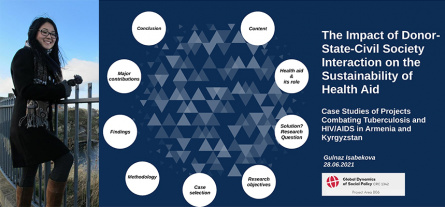
Gulnaz Isabekova, PhD student and member of project B06, successfully defended her dissertation "The Impact of Donor-State-Civil Society Interaction on the Sustainability of Health Aid. Case Studies of Projects combatting Tuberculosis and HIV/AIDS in Armenia and Kyrgyzstan". After an online presentation of her work lasting about half an hour (with an audience of about 40 guests), Isabekova discussed her research design and main findings with the examining board. The board* evaluated Isabekova's work and presentation very positively and, after a short consultation, congratulated her on passing the oral examination.
In her work, Isabekova examined how different types of interaction among stakeholders (i.e., international development organizations, governments, and civil society organizations) affect the sustainability of aid programmes in the field of health care. She focused on the countries following the project-based (Armenia) and Sector-Wide Approaches (Kyrgyzstan) to development assistance. Isabekova studied three large healthcare projects financed by the Global Fund to Fight AIDS, Tuberculosis and Malaria, and the Swiss Agency for Development and Cooperation. Planned and implemented by recipients and not providers of development assistance, all three programmes represented the “bottom-up” approach to health aid. However, the projects varied in terms of their objectives and presence of conditions attached to the funding.
For her work, Isabekova collected the project-related documentation on selected cases and systematically analyzed the studies on development assistance, interaction among stakeholders, and sustainability of health aid in the context of developing countries. She has also conducted around 100 semi-structured interviews in the field and, on this basis, worked out causal mechanisms and hypotheses that explain the influence of the interaction among stakeholders on the sustainability of aid projects, i.e., whether project activities, benefits, and community capacity building persist locally after project funding has ended. According to Isabekova, although context-specific, these causal mechanisms and hypotheses are transferrable to health programmes in other developing countries following the project-based or Sector-Wide Approaches to development assistance.
Isabekova will submit her dissertation to the State and University Library for publication in the coming weeks.
Gulnaz Isabekova is the second doctoral student in CRC 1342 to complete her PhD, following Jean-Yves Gerlitz (project A03). Many more will follow in the coming weeks.
---
* consisting of Prof. Dr. Heiko Pleines (first supervisor, University of Bremen), Dr. Monika Ewa Kaminska (second supervisor, University of Bremen), Assoc. Prof. Kristina Jönsson (external examiner, Lund University), Prof. Dr. Tobias ten Brink (Jacobs University), Prof. Dr. Michael Rochlitz (University of Bremen), Dr. Amanda Shriwise (University of Bremen) and Liva Stupele (University of Bremen).
---
Further readings:
Isabekova, Gulnaz, 2020: Mutual learning on the local level: The Swiss Red Cross and the Village Health Committees in the Kyrgyz Republic, in: Global Social Policy, online first.
Isabekova, Gulnaz; Pleines, Heiko, 2020: Integrating development aid into social policy: Lessons on cooperation and its challenges learned from the example of health care in Kyrgyzstan, in: Social Policy & Administration, online first.
Isabekova, Gulnaz, 2019: The relationships between stakeholders engaged in development assistance: towards an analytical framework, SOCIUM SFB 1342 WorkingPapers/3/2019, Bremen: SOCIUM, SFB 1342.
Contact:
Dr. Gulnaz Isabekova













